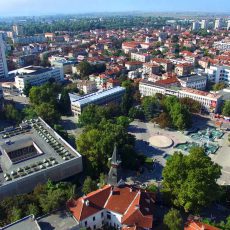The BIOCIRCULARCITIES project aimed to unlock the circular economy potential of unexploited bio-based waste streams and boost the green and sustainable transition. This transition to a circular bioeconomy requires reconciling legislation, waste management, circularity, and the bioeconomy.
For two years, BIOCIRCULARCITIES has been exploring the development of economically and environmentally efficient models for organic waste (food and kitchen waste, garden waste, agricultural waste from agro-based industrial sector, wood waste and forestry residue, etc.) management to foster the transition to a circular bioeconomy.
For that, the partners have rolled out three pilot studies in urban (Barcelona Spain, and Naples, Italy) and rural contexts – (Pazardzhik, Bulgaria) – focusing each time on one specific value-chain and investigating possibilities to make it more circular.
In addition, the Biocircularcities partners have identified existing best practices for circular use of bioresources across Europe and analysed case studies in which bio-waste is underexploited. Lessons learnt from these practices and insights into circular bioeconomy regulations and policy instruments enabled partners to map barriers and opportunities that in turn fed guidelines and policy recommendations supporting the implementation of “Biocircular cities” first at local and then at the European level.

Vision
At the end of its two years, Biocircularcities is contributing to:
- Improve the uptake of bio-based solutions by the market, and especially SMEs, by:
- Aligning the bio-based industry’s R&I with relevant regulation, enabling especially SMEs without large in-house strategic departments to achieve pan-European value chain integration and market reach;
- Providing opportunities for early-stage projects to evaluate their business case against current and upcoming regulations;
- Helping bio-based alternatives to take advantage of the regulatory framework to compare their impact with fossil-based solutions;
- Preventing knowledge gaps on regulation hindering the market entry of bio-based processes and products.
- Promote the development of successful circular bioeconomy strategy in EU territories by:
- Incentivising the recovery of bio-waste in line with the principles of the circular bioeconomy by providing useful and accurate information on existing Best Practices for circular use of bioresources;
Pilots
To investigate possibilities to make local bioeconomy more circular, Biocircularcities has rolled out three pilot studies focusing each time on a dedicated challenge and a specific value-chain.
Discover them!
Metropolitan Area of
Barcelona (ES)
The goal: Incentivising quality and quantity of biowaste separately collected in the urban context represented by the Metropolitan Area of Barcelona and exploring the feasibility of producing added value bioproducts.

BBI-JU
The Bio-based Industries Joint Undertaking (BBI JU) is a €3.7 billion Public-Private Partnership between the European Union and the Bio-based Industries Consortium (BIC) aiming to strengthen and structure the bio-based industries sector in Europe. BBI JU’s mission is to implement, under Horizon 2020 rules, the Strategic Innovation and Research Agenda (SIRA).
Circular Bio-based Europe Joint Undertaking is the legal and universal successor of BBI JU in respect of all contracts, grant agreements and liabilities.


